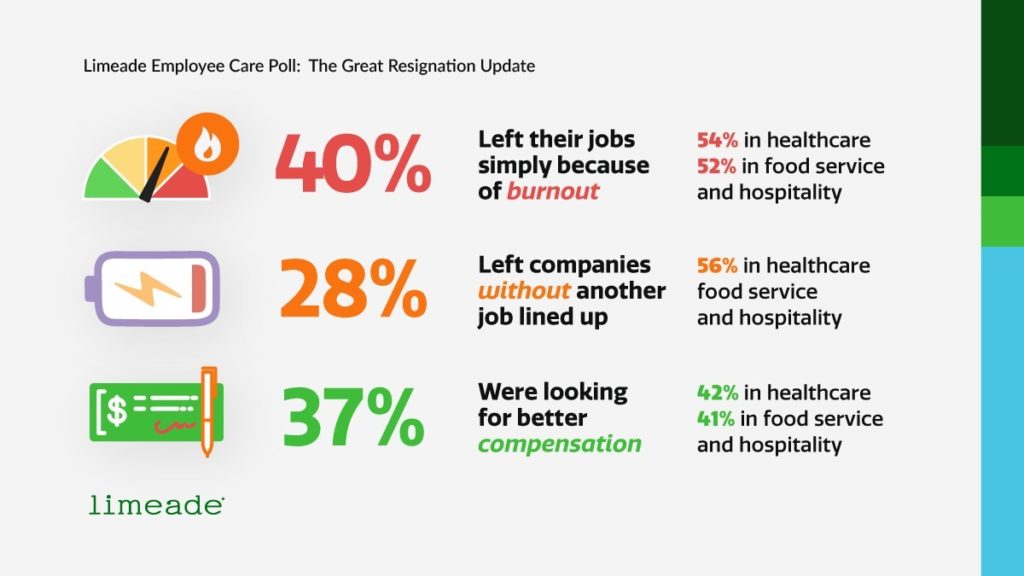The main drivers of the Great Resignation are burnout, and lack of being valued and cared for by employers, confirmed a new study.
In fact, 40% of employees cited burnout as the top reason for leaving their job, confirmed research carried out by wellbeing company Limeade. Additionally, more than a quarter resigned without a job lined up because they were so dissatisfied with their work situation. Job openings in the US surged to an all-time high of 10.1 million at the end of June, with 19 million workers quitting their jobs between March 2021 and July 2021, according to the report.
The firm’s latest study, The Great Resignation Update, has identified the main drivers that led to the mass exodus of employees in late 2020 and early 2021; as well as how companies can improve their efforts to retain top talent through care.
TOP GREAT RESIGNATION DRIVERS
Respondents cited burnout, lack of flexibility and not feeling valued as the top resignation drivers; indicating a lack of care and a desire for greater wellbeing. In fact, around 28% of employees left their jobs without another job lined up because they were so unhappy. These employees were also 1.7 times more likely to cite burnout as their reason for resigning.
The other reasons for employees leaving their job apart from burnout, include organisational changes at the company (34%); lack of flexibility; discrimination and contributions/ideas not being valued (combined 20%). Additionally, 19% of staff left due to insufficient benefits; and 16% departed because their wellbeing was not supported by the company.
When searching for greener pastures, respondents cited the ability to work remotely, better compensation and more employee care as top criteria for new roles. Flexibility is key, note the study. Job-changers are attracted to new positions that offer the ability to work remotely (40%); better compensation (37%); and better management (31%).

GAME-CHANGING BENEFITS
The survey also found that 29% of job changers received a 10-19% salary increase; while 13% took a pay cut for their new position. However, around 23% indicated they are paid the same amount, revealing better compensation isn’t an absolute requirement for job changers.
Better employee care, however, is a game changer for employees. After jumping ship, staff reported a 22% boost in feeling cared for as a person by their new employer. But only 9% of total respondents saw a decrease in the number of hours they’re currently working; suggesting that the number of hours an employee works isn’t necessarily a determining factor for burnout.
“The mass exodus workplaces have experienced over the past several months is unprecedented. Burnout levels reached an all-time high. There was a societal breakdown when it came to the ecosystem of work, home and wellbeing. People reached their limits,” stated Limeade’s Chief Science Advisor Laura Hamill. “At Limeade, our mission is to improve wellbeing in the world. Because of this we knew it was important to examine this event and ask the Great Resignation job-changers what happened; what they experienced; and how employers can do better.”

The Limeade Institute recognises “care” as looking after and providing for the needs of someone or something. To better support employees – particularly in times of crisis or heightened mental health pressures – it is vital for employers to bring employee feedback into the fold. When employers utilise anonymised pulse surveys, they can gather employee feedback, transparently share findings and take action, according to Limemade. By asking staff for their input, employers can create more intentional employee experiences that are centred around care; and better empower employees to prioritise their overall wellbeing.
EMPLOYEE WELLBEING MATTERS
“We have to do better. We have to take care of ourselves and others; and that means caring more for employees. Listen to employees. Ask them what they need,” added Hamill. “Do they need more flexibility? More autonomy? More trust? The Great Resignation is a great opportunity for employers to evolve, learn and do better. The companies that learn and grow from this feedback will succeed.”
The Great Resignation Update, is part of the Limeade employee care research series, which focuses on the link between organisational care and employee wellbeing. The report surveyed 1,000 full-time US workers who started a new job in 2021; and have been at their new organisation for at least three months. Click here to access the report.
A staggering two-thirds of Americans want to switch jobs right now, according to a new study. Additionally, one in three Generation Z and Millennial workers are actively looking for a new job. Click here to read more.




































